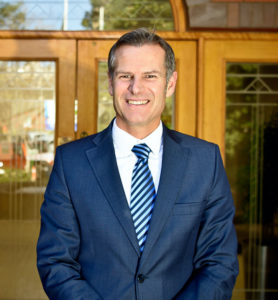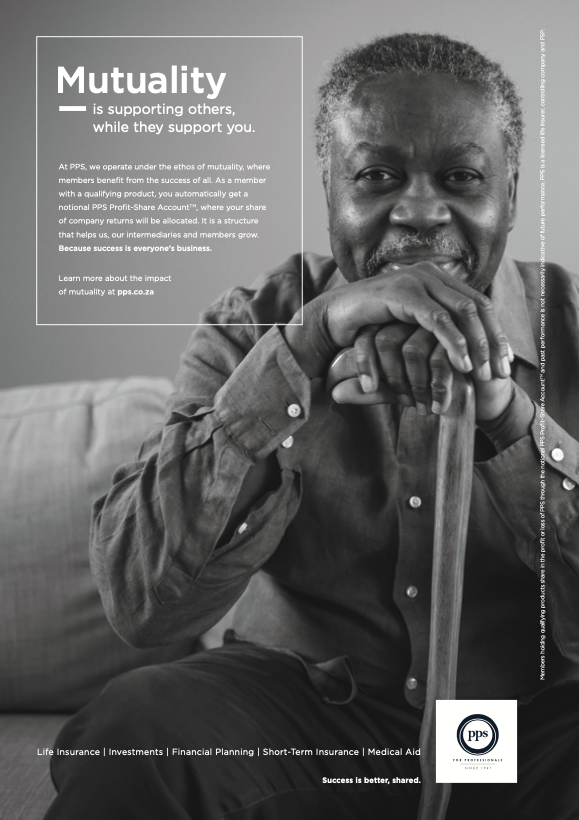In conversation with COVER, PPS, Group CEO, Izak Smit shares his thoughts on innovations in the industry, the future of intermediaries and the mutuality of insurance
Tony kicked off the conversation by asking Izak to describe where we are currently at as an industry.

Izak: South Africa is a challenging environment with low growth impacting the financial services industry and our consumers. It reminds me of a quote by Warren Buffet, “when the tide is out, you see who has been swimming naked.” Now the tide has been out for a very long time in South Africa. We are confronted with many challenges that people in other places do not have, like load shedding and talks of grid failure. All these things are not even on the radar of our counterparts in other countries.
But there are always opportunities. One thing about the South African industry and South African managers, in general, is that we can make plans, and we figure out how to deal with whatever comes our way. From the PPS perspective, we still saw growth in new business last year, despite the environment. So far, this year has been a bit more subdued, but in general, there is not much growth.
Tony: Globally, our industry is seen as quite innovative, and we have seen many firsts coming from here and being duplicated and grown outside our borders. If you were to look at the last two decades, what would you say were the greatest innovations in the insurance industry?
Izak: I have just had the privilege of visiting our business in Australia and we are also busy setting up a business in New Zealand. There is quite a bit of admiration from the actuaries over there, who often talk about the innovation coming from South Africa. For example, Critical Illness cover was developed here while many innovations in the short-term insurance industry also started here.
It comes back to the challenges that we must often face. We must think on our feet, and we must be nimble. That is just the nature of doing business in South Africa.
As for big innovations in the last two decades, I would say it is not necessarily an insurance or financial services innovation, but it is all around us, it is our way of doing business that has changed significantly. COVID taught us a couple of things and that is not the innovation from South Africa, it is just piggybacking on how the world had to develop. But I would say a lot of the innovation that we see in the insurance, the investments, and financial services industries, are often due to things that happen in the world in general, like smartphones and digitalization in other areas that we then use in our industry. We are continuously innovating around ways to deliver service.
The basics of financial services are simple, not much to innovate: We have a premium in and there is a claim payout if something bad happens, savings in and there is a payout point. It is the innovation around that and how we make our jobs easier for our store and our intermediaries, where the real innovation happened. Not so much the products per se, the core thing that we give to our consumers, but rather how we go about it, like things that we used to do manually in the past that we can now rely on technology to do for us.
Tony: PPS is one of the last big Mutuals in South Africa. How do you see the future of Mutuals in South Africa and globally?
Izak: We are the biggest financial services provider that operates under the ethos of mutuality in the country, and in fact, at times in Africa, depending on the exchange rate and how you measure it.
Sadly, in Africa, mutuality is not a common model anymore, especially with the de-mutualization of a couple of big players at the end of the previous century. In fact, below 2% of insurance premiums in Africa go to Mutuals. But in the rest of the world, especially the Northern Hemisphere in countries such as the USA, Europe, and Japan, it is a common model. About a third of premiums that go to insurance businesses globally, both life and short-term, still goes to Mutuals.
It is interesting because in Africa we have Stokvels and Ubuntu, so it seems that the mutual model is something that should be more common here. We do believe it is a wonderful model that will grow again in Africa. The nice thing is that there is not a shareholder involved that is looking for dividends, all the benefits go back to the members, that is the reason for the business to exist.

Mutuality
-is supporting others,
while they support you.
At PPS, we operate under the ethos of mutuality, where members benefit from the success of all. As a member with a qualifying product, you automatically get a notional PPS Profit-Share Account ™, where your share of company returns will be allocated. It is a structure that helps us, our intermediaries and members grow.
Because success is everyone’s business.
Members holding qualifying products share in the profit or loss of PPS through the notional PPS Profit-Share AccountTM and past performance is not necessarily indicative of future performance. PPS is a licensed life insurer, controlling company and FSP.
For mutuals especially, the purpose is important and so natural. It is the reason for our existence. We exist to be purposeful for our members. We do challenge ourselves at PPS and say that there is so much more that we can do. The way we apply Mutuality is by returning all the profits, which is fantastic and unique. It is almost innovative in the world these days to do it that way. Other mutuals do it in other ways, but we challenge ourselves and look at what else we can do. Can we stretch it further than only the numbers? Can we play a bigger role, obviously from a financial perspective, but also a bigger role in our members’ lives as a mutual?
There are things that we can do that a stock business would think twice about because they need to worry about what is going back to the shareholder. Our thinking is more about being fair to all the members and different groups within the members when asking, what is the best value we can return?
It does not always have to be rands, it can be making sure everybody has a financial plan. We can start playing in the space of wellness and things like that. That is a true Mutual.
Tony: Now looking ahead, what are your thoughts on the relevance of the intermediated market over the next decade?
Izak: When you look at AI and robotics and technology sites, where you can do it yourself, many ask what is the value that intermediaries add? These technologies just allow people to play at a different level. Things that intermediaries had to do in the past, like ship paper, is not necessary these days. Good intermediaries do other things now that humans can do better than machines, like managing emotions. We know the biggest value destruction in investments is often due to us, the guy in the mirror. We sometimes make poor decisions, and a good intermediary can help us stay the course and keep us disciplined, helping us to stick to the plan and not make rash decisions. Even successful and well-educated people such as economists, accountants, and often financial advisors themselves, tell me that they need a third party to bounce their ideas off.
If those people need a financial advisor, everybody needs a financial advisor.
Tony: Which issues in the industry do you see as most effective for us to focus on to ensure sustainability, especially during these uncertain economic and political times?
Izak: Sustainability is a big one that is more on a global scale these days. It is about the environment and climate change.
I do not think that South Africa always appreciates it because of all our other issues and problems that we must focus on. It is going to come our way very soon, and much bigger than we anticipate. It is going to impact trade and it is going to impact a lot of things. We do not have a choice in South Africa, other than making it a big one on the national agenda. Businesses can and must proactively apply their minds to what that means. For our industry, for example, it will include and impact the assets and the way we invest.
In the short-term industry, we must apply our minds to big risk events that are climate related, while it is also in the small things that we do, where we need to have a greener mindset. Things like carbon tax will potentially become a big issue in the future, and it is likely to come our way quite soon, because of global dynamics impacting the way we do business.
If we can proactively think about sustainability from that perspective, we can make it happen. I imagine that South Africa is going to be an example of how we have leapfrogged to be one of the greenest economies. Because out of necessity we must throw up solar panels and things now.
A few years from now most households and small to larger businesses will be using greener solutions. and that is sustainability.

